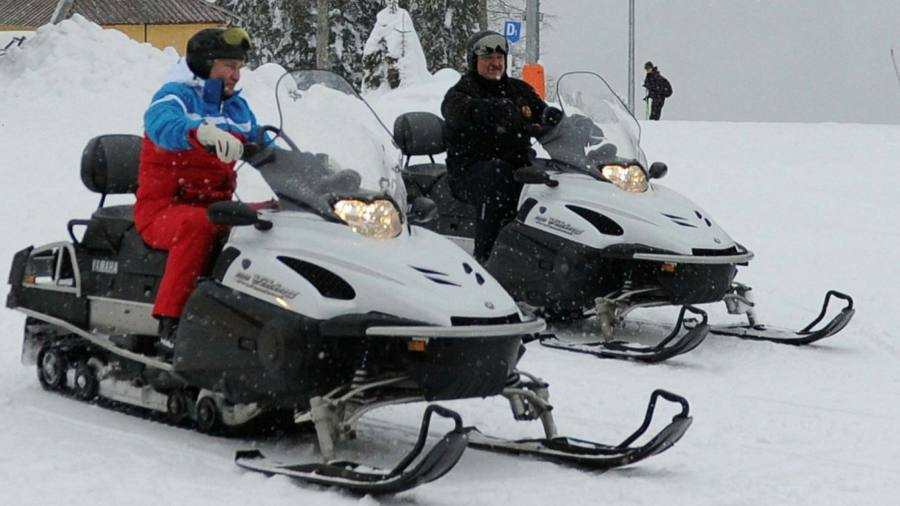[ad_1]
As news of new EU sanctions against Russia began to leak out of a meeting of bloc foreign ministers on Monday afternoon, Vladimir Putin and his Belarusian counterpart Alexander Lukashenko were discussing a different challenge to the Russian president.
“You can try to compete with Vladimir Vladimirovich,†Lukashenko, in ski gear, said to his son, Nikolai. “But you probably won’t catch up,†he added, with a smile to Putin as the Russian leader pushed off down the slope.
Putin and Lukashenko are the men behind Europe’s two repressive crackdowns over the past six months, who have both jailed or exiled their most prominent opponents and seen their security forces violently assault and detain thousands of peaceful protesters.
But in a summit in the snow-covered mountains of Sochi, on Russia’s southern coast, they revelled in their twosome of leaders shunned and sanctioned by Brussels, in a calibrated message to the EU that the cold-shoulder was mutual.
For foreign policy experts there were few details to digest, despite the complex negotiations going on behind the scenes as the two post-Soviet states seek to recalibrate their future relationship.
Putin is keen to deepen integration on Moscow’s terms. Lukashenko is desperate for Russian investment and trade co-operation but is loath to relinquish sovereignty. Yet in place of diplomatic negotiations and policy pronouncements, photographs and video footage of the two leaders enjoying each other’s company were in full display.
At the outset, Putin, in jeans and an open-collar shirt and blazer, greeted his guest with a handshake and a hug. “Even our appearance, clothes and so on, suggest that these are serious negotiations in ordinary clothes,†Lukashenko quipped. “It suggests that we are close people.â€
Pleasantries exchanged, it was time for the salopettes and ski boots, and a shared chairlift to the summit. Putin, pushing off confidently, set off down the gentle slope, Lukashenko in his wake.
After a short ride on snowmobiles back to their chalets, discussions continued over more than six hours — and what appeared to be three different sized wine glasses.
“The optics for the international audience is that they have been able to maintain their positions and nothing can be done against them,†said Maryia Rohava, a research fellow at Oslo university specialising in post-Soviet relations.
“Now we’re talking not just about sanctions against Belarus but also against Russia,†she added. “And it seems like they look at that like, ‘Well, we don’t care . . . We’re just enjoying our winter break like autocrats do.’â€
To be sure, the fun on the slopes was not wholly without power games. Putin was clear to underscore he was the senior partner, from wrongfooting his guest at the top of the ski lift to releasing photographs of their meeting showing Lukashenko scribbling notes as his host spoke.
But the mood music was in sharp contrast to Lukashenko’s last visit to Russia in September. Then, with protests raging and the Belarusian leader’s position looking shaky, Putin reprimanded his guest for mishandling the unrest and risking the toppling of an ageing post-Soviet regime that could weaken his own.
Then, in a businesslike and cold atmosphere, Lukashenko pleaded with Putin that “a friend is in trouble†and was granted a $1.5bn loan from Moscow — but not before his host remarked that Belarusian people should be given a chance to “sort this situation outâ€.
The absence of such language on Monday also sent a subtle signal to other illiberal regimes, particularly those on the outer rim of Europe who, like Belarus in the past, find themselves lured towards Brussels by economic opportunities but repelled by the reforms and democratic standards demanded in exchange.
The message to the likes of Georgia, Moldova, Armenia and Turkey is that Putin, whose relations with the EU are at rock bottom, is always ready to talk.
[ad_2]
Source link





